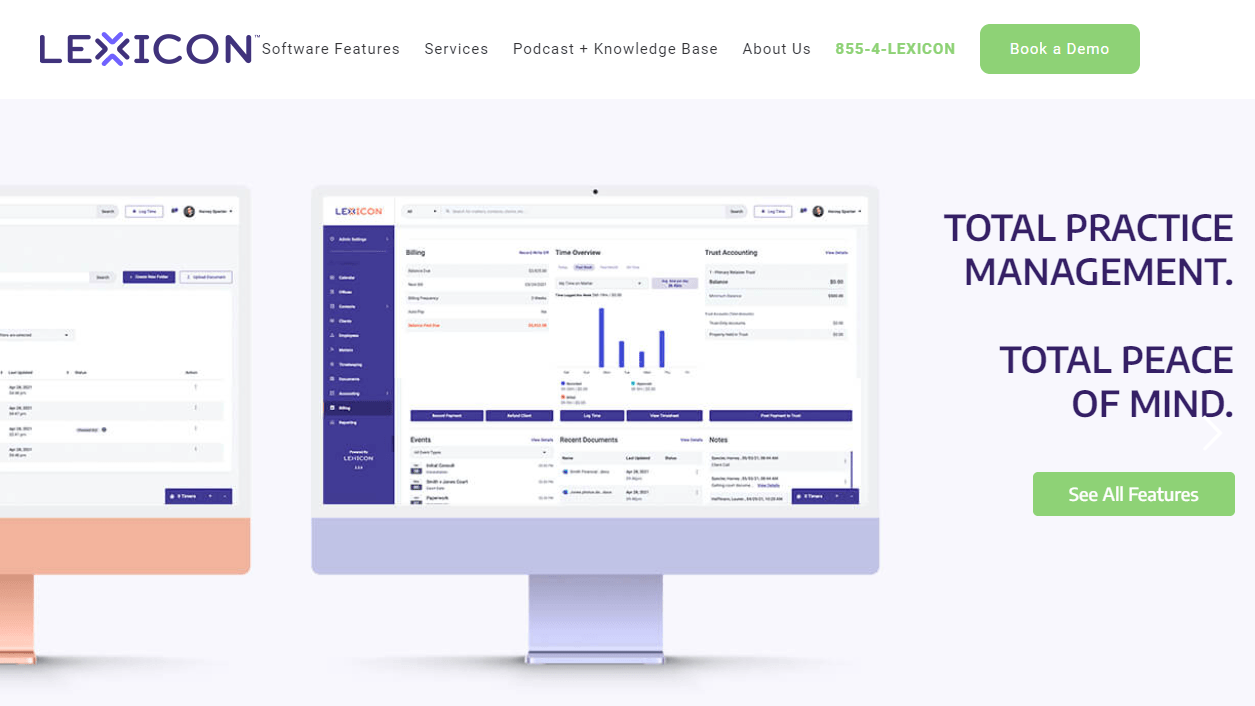Since its formal launch in June 2020, Lexicon has taken a unique approach to providing a solution to lawyers’ practice management needs.
Not only is it a full-featured, practice management software platform, but it also offers an array of the essential services a law firm needs — services that tightly integrate with the platform but which can also be purchased à la carte.
Now Lexicon is doubling down on that approach by expanding the menu of services it offers — a menu that ranges from facilities management and information technology to virtual paralegals and virtual receptionists.
“With all the advances New Law and the pandemic have brought, law firms should not be handling everything in-house that’s not directly related to practicing law,” said Dan Cuneo, who took over as the company’s CEO last July after a career practicing law at the firm Cordell & Cordell in St. Louis, Mo.
“It does not make sense from a financial or efficiency standpoint,” he said. “That is why we continue to expand our offerings, including support services.”
Menu of Services
With the market for practice management software already crowded, a key way Lexicon distinguishes itself is by tightly integrating its software with complementary service offerings. When it launched, it initially offered three services: Virtual Receptionist, Recruiting and Marketing. Now it has added another five, so that the full menu of services it offers are:
- Facilities Management. Lexicon will oversee real estate leasing and purchasing for a firm. This includes site selection, space planning, lease negotiation, finishes and décor selection, and ordering of furniture and fixtures. Lexicon will also maintain and repair office space; order office supplies and services such as beverages, stationery and postage; and supports anything not connected to an IT network.
- Information Technology (IT). The Lexicon Technical Services Center will provide law firms with end-user computing support, deployment of equipment and IT training. This includes front-line support when technology issues arise; advice on protecting data, endpoints, infrastructure and web applications; and conducting threat assessments and remediation.
- Legal Operations and Training. Lexicon says this service functions as subject matter experts for a firm’s legal staff, providing consulting and training to help optimize training programs, interview processes, the implementation and execution of new policies and procedures and the development and maintenance of performance dashboards.
- Marketing. Lexicon says it will provide a range of legal marketing services, using both traditional and digital strategies to build a law firm’s brand and drive leads. Services include website auditing and consulting, social media, email campaign management, graphic design, public/media relations and more.
- Practice Quality. Lexicon says its practice quality service manages the development and implementation of optimized business processes, including quality standards evaluation and development; designing and deploying client satisfaction surveys; implementing internal scorecards to ensure adherence to case management standards; and identifying continuous improvement opportunities.
- Recruiting. Lexicon’s recruiting service will manage everything involved with hiring and onboarding staff and attorneys. This can include recruiting, interviewing, background checks, assessments, offers, negotiations and more. Lexicon also offers HR consulting and compensation guidance.
- Virtual Paralegal. Lexicon offers virtual paralegals for both short- and long-term engagements. It says this service can be an asset to firms looking for flexibility and efficiency in their staffing.
- Virtual Receptionist. This service provides professional phone answering by real people. Receptionists can provide callers with basic information, transfer calls and relay messages to designated individuals. When this service is combined with Lexicon’s software platform, receptionists can input client intake directly into the platform.
Firms can purchase these services à la carte and without having to be a subscriber to Lexicon’s software platform. Regardless of which or how many services a firm buys, the firm is able to manage them all through a single dashboard, which is also the hub for the software platform, if the firm subscribes.
Simplicity and Efficiency
During a recent call with Cuneo, the CEO, and Lauren Hoffmann, senior brand manager, they told me that Lexicon provides all these services directly, using its own staff.
For law firms, the advantage of Lexicon’s approach to combining software and services is simplicity and efficiency, they said.
“If you think about overhead, you’re not staffing anyone full time, you’re not paying to have them on your payroll when you don’t really need someone sitting there full time,” Hoffmann said.
They said that the most popular service is virtual paralegals. They said that demand for this service is high, and that they offer paralegals who are specialized in almost any area of law.
Lexicon’s software is priced on a per-user, per-month basis on three tiers, depending on the features a firm wants. The basic tier is $63, with higher-level tiers offered at $75 and $99.
The services are all sold separately and pricing varies with the service and scope of the service.
“Firms will only be able to succeed in this new hyper-competitive legal marketplace if they make sensible and strategic decisions about what they do in-house,” said Cuneo. “That’s why we at Lexicon are committed to taking as much of that burden from firms as possible and doing so in an integrated way.”
Related: New Practice Management Platform Debuts; How It Differs from the Others.
 Robert Ambrogi Blog
Robert Ambrogi Blog